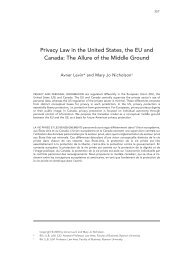Commentary on Fichte's “The Illegality of the Unauthorised ... - uoltj
Commentary on Fichte's “The Illegality of the Unauthorised ... - uoltj
Commentary on Fichte's “The Illegality of the Unauthorised ... - uoltj
Create successful ePaper yourself
Turn your PDF publications into a flip-book with our unique Google optimized e-Paper software.
(2008) 5:1&2 UOLTJ 141<br />
<str<strong>on</strong>g>Commentary</str<strong>on</strong>g> <strong>on</strong> Fichte 153<br />
to be forbidden, since no reader <strong>of</strong> an illegitimate reproducti<strong>on</strong> could appropriate<br />
<strong>the</strong> pers<strong>on</strong>al imprint <strong>of</strong> <strong>the</strong> author c<strong>on</strong>tained in <strong>the</strong> expressi<strong>on</strong> <strong>of</strong> <strong>the</strong> ideas.<br />
However, at issue is not <strong>the</strong> reader’s understanding <strong>of</strong> <strong>the</strong> ideas, but ra<strong>the</strong>r <strong>the</strong><br />
representati<strong>on</strong> <strong>of</strong> <strong>the</strong> form <strong>of</strong> <strong>the</strong> expressi<strong>on</strong> as authorised by <strong>the</strong> author. The<br />
producti<strong>on</strong> <strong>of</strong> an unauthorised editi<strong>on</strong> is a violati<strong>on</strong> <strong>of</strong> <strong>the</strong> author’s right because,<br />
while it acknowledges that she is <strong>the</strong> creator <strong>of</strong> <strong>the</strong> communicati<strong>on</strong>, it ignores <strong>the</strong><br />
author’s right to <strong>the</strong> form, i.e., <strong>the</strong> fact that <strong>the</strong> unique form she has given to <strong>the</strong><br />
communicati<strong>on</strong> <strong>of</strong> an idea is a representati<strong>on</strong> <strong>of</strong> a unique aspect <strong>of</strong> her pers<strong>on</strong>ality.<br />
As Fichte later states, <strong>the</strong> problem is not that <strong>the</strong> illegitimate publisher fails to<br />
acknowledge that <strong>the</strong> author wrote <strong>the</strong> words, but ra<strong>the</strong>r, that he fails to recognise<br />
her status <strong>of</strong> author, 56 and <strong>the</strong>reby <strong>the</strong> imprint <strong>of</strong> her pers<strong>on</strong>ality <strong>on</strong> <strong>the</strong> words.<br />
This difference can be made clearer if we recall <strong>the</strong> distincti<strong>on</strong> between<br />
<strong>the</strong> Enlightenment c<strong>on</strong>cept <strong>of</strong> author and earlier c<strong>on</strong>cepti<strong>on</strong>s <strong>of</strong> authorship. If<br />
<strong>the</strong> author is merely <strong>the</strong> vessel for some external creative inspirati<strong>on</strong>, <strong>the</strong>n <strong>the</strong><br />
reproducti<strong>on</strong> <strong>of</strong> <strong>the</strong> author’s work poses no problem since <strong>the</strong> author was not its<br />
source. But if <strong>the</strong> author is c<strong>on</strong>sidered as providing her own inspirati<strong>on</strong>, <strong>the</strong>n <strong>the</strong><br />
reproducti<strong>on</strong> <strong>of</strong> <strong>the</strong> author’s work without her permissi<strong>on</strong> fails to recognise that<br />
she is <strong>the</strong> source <strong>of</strong> <strong>the</strong> ideas, as attested to by <strong>the</strong> unique form that she has given<br />
to <strong>the</strong> communicati<strong>on</strong>.<br />
Hidden behind Fichte’s argument is a view about <strong>the</strong> nature <strong>of</strong> right<br />
itself. In this first secti<strong>on</strong> <strong>of</strong> his argument, Fichte does not appeal to <strong>the</strong> actual<br />
practice <strong>of</strong> authors and publishers or to existing law. Ra<strong>the</strong>r, he appeals to what<br />
can be deduced a priori from <strong>the</strong> fact that each pers<strong>on</strong> is a unique individual. He<br />
points out that <strong>the</strong> uniqueness <strong>of</strong> each individual precludes o<strong>the</strong>rs from claiming<br />
as <strong>the</strong>ir own those things which express <strong>the</strong> individual’s unique pers<strong>on</strong>ality. The<br />
hidden premise <strong>of</strong> this argument is that <strong>the</strong> nature <strong>of</strong> humans as free and unique<br />
individuals entails that <strong>the</strong>ir unique pers<strong>on</strong>ality be free from interference by o<strong>the</strong>rs.<br />
In <strong>the</strong> case <strong>of</strong> <strong>the</strong>ir physical pers<strong>on</strong>, this means recogniti<strong>on</strong> <strong>of</strong> rights in physical<br />
property, since <strong>the</strong> appropriati<strong>on</strong> <strong>of</strong> <strong>the</strong> physical property <strong>of</strong> ano<strong>the</strong>r would entail<br />
violati<strong>on</strong> <strong>of</strong> <strong>the</strong> bodily integrity <strong>of</strong> <strong>the</strong> pers<strong>on</strong> who possesses <strong>the</strong> object. In <strong>the</strong><br />
case <strong>of</strong> intellectual property, <strong>the</strong> idea <strong>of</strong> right entails recogniti<strong>on</strong> <strong>of</strong> a right in <strong>the</strong><br />
form in which ideas are expressed, since <strong>the</strong> appropriati<strong>on</strong> <strong>of</strong> this form without<br />
permissi<strong>on</strong> is a failure to recognise that this form could <strong>on</strong>ly arise from <strong>the</strong> unique<br />
manner in which <strong>the</strong> individual c<strong>on</strong>nects ideas and represents <strong>the</strong>m to herself. It<br />
is from this idea <strong>of</strong> right and <strong>the</strong> nature <strong>of</strong> human creative expressi<strong>on</strong> that Fichte<br />
derives <strong>the</strong> two rights <strong>of</strong> <strong>the</strong> author: her right to be recognised as <strong>the</strong> author <strong>of</strong><br />
<strong>the</strong> work and her right to exclude o<strong>the</strong>rs from appropriating that work. 57<br />
In deriving an a priori right to intellectual property, Fichte provides a<br />
more elaborate explanati<strong>on</strong> <strong>of</strong> a rights-based justificati<strong>on</strong> for copyright than Kant.<br />
For while Kant c<strong>on</strong>tents himself with arguing against <strong>the</strong> legality <strong>of</strong> reprinting<br />
primarily based <strong>on</strong> <strong>the</strong> relati<strong>on</strong>ship between <strong>the</strong> publisher and <strong>the</strong> author, in which<br />
<strong>the</strong> former is <strong>the</strong> authorised representative <strong>of</strong> <strong>the</strong> latter, 58 Fichte’s arguments<br />
lead back to a rights-based understanding <strong>of</strong> law and a rejecti<strong>on</strong> <strong>of</strong> competing<br />
56. Fichte, “Pro<strong>of</strong> <strong>of</strong> <strong>the</strong> <strong>Illegality</strong> <strong>of</strong> <strong>the</strong> Reproducti<strong>on</strong> <strong>of</strong> Books,” supra note 2 at para. 11.<br />
57. Fichte, “Pro<strong>of</strong> <strong>of</strong> <strong>the</strong> <strong>Illegality</strong> <strong>of</strong> <strong>the</strong> Reproducti<strong>on</strong> <strong>of</strong> Books,” supra note 2 at para. 9.<br />
58. Kant, “V<strong>on</strong> Der Unrechtmäßigkeit des Büchernachdrucks, “ supra note 9 at p. 79. Kant also describes this<br />
relati<strong>on</strong>ship in terms <strong>of</strong> <strong>the</strong> “mandate” given to <strong>the</strong> publisher by <strong>the</strong> author (see Immanuel Kant, The<br />
Metaphysics <strong>of</strong> Morals, Mary Gregor, ed. (Cambridge University Press, 1996) at p. 72).









